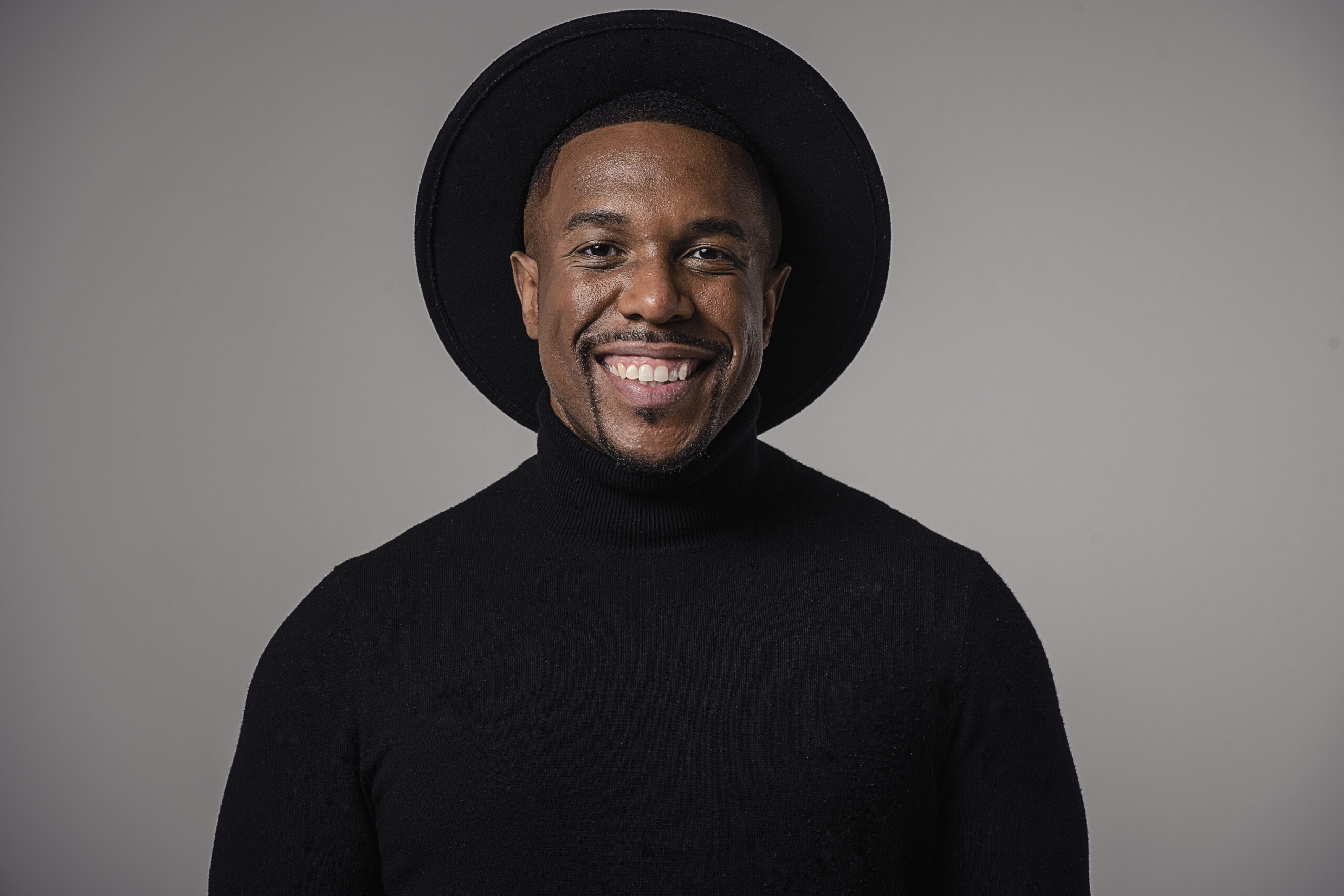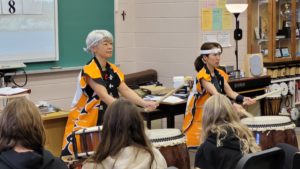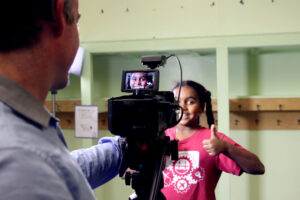News: The Pursuits Of Stefan Keyes: How Ottawa’s Multifaceted Media Man Has Carved A Meaningful Career In The Capital
By MASC | November 29, 2022

Published March 7, 2022 at FacesMag.ca
I had recently joined the school on scholarship through an arts education organization called MASC and had way less formal training than my peers. It was pivotal because I realized my life opportunities didn’t have to be limited by my financial circumstances.
Stefan Keyes, MASC Board of Directors and former MASC Arts Awards recipient
Whether it’s reporting for CTV News or making cameos as an actor in the latest Christmas movies or Netflix series, Stefan Keyes is inspired and motivated by the women in his life.
Stefan grew up in Ottawa as an only child to his mother in a complicated upbringing. He found happiness through faith and was always supported by the family and community that surrounded him.
Last November, Stefan found himself as a storyline when he was trapped in South Africa due to a positive COVID-19 test and could not return home as planned. What was supposed to be a week where he celebrated a wedding quickly turned into a stressful extra two weeks.
We caught up with Stefan to talk about his journey to the media industry, the stressful time he spent returning from South Africa and the women who inspire him every day.
You were born and raised in Ottawa. What was your childhood like growing up?
My childhood was complicated; but happy. Complicated in the sense that I had to come to terms with the fact I was going to be fatherless my entire life. When society has hyper-normalized the ideas and benefits of a two-parent household, it can skew your understanding of self-worth. Add that to race-related issues, and what it means to be Black in Canada, the complexities of childhood are magnified.
My family ensured that I was a trillionaire when it came to the currency of love. I learned the value of a dollar at a young age; and learned to appreciate how it was earned and spent. I’m my mother’s only child, and she worked weekends, so she would send me to church with other members of the Jamaican community, where I deepened a love for gospel music and singing.
In high school, you did a segment with CBC Radio called Outfront and started writing as a teenager for ‘The Spectrum.’ How did that come about?
In my last year of high school, I looked at the freelance opportunity at CBC as a way to dip my toe in broadcasting to see if I would like it. Many don’t realize, but I sit on the cusp of being an introvert. It was a self-reflective collection of spoken word, singing, and testimony around faith. The producer working with my overly ambitious 17-year-old self, Laurence Stevenson, pushed me to dig deeper and go further. I’ll never forget working with Laurence. I likely tested his patience, but I’m glad he took a chance on me.
On the other hand, writing for the Spectrum was a more natural endeavour. It wasn’t national mainstream media; It was a monthly, local community newspaper that showcased Black success and catered to the interests of Ottawa’s Black community. It was a publication spearheaded by Jamaican-Canadian Ewart Walters, who studied journalism at Carleton University. Having been featured in it several times for various academic achievements, it was natural to start writing for the publication I grew up reading when considering a career in journalism.

Why did you want to get into journalism?
I gave up a scholarship to study musical theatre in New York City, so it wasn’t my first plan, but I’ve been fascinated with television for as long as I can remember. I watched a lot of Fresh Prince of Belair in addition to the TGIF lineup religiously.
Perhaps, that’s where the acting came in. I also watched the news regularly with my mom. CJOH (now CTV Ottawa) was always on at 6 and 11:30; no arguments come news time.
I grew to like news. It gave me a new mission to study journalism and take the presentational and production skills I learned from theatre and apply it to this new craft. My English teacher at the time, Mr. Blauer, was a former journalist himself and encouraged me to consider it as an option as he thought I would do well.
What are some of the more memorable stories you’ve reported on?
Sadly, tragedy always lingers with you, and I’ll never forget covering my first fatality in 2009. It was a triple fatality in Navan at the end of summer. Two of the victims, 18, had just graduated high school and a 16-year-old girl also died. Bouquets of flowers, tears streaming down faces, arms folded, hats turned backwards, and their hearts turned upside down. I’ll never forget the discomfort of doing my job that day asking for comments when all they needed was compassion.
The other time that really sticks with me was when I was anchoring the 11:30 news a couple of years ago and had to stay composed and professional while reporting my friend as the victim of a fatal crash in Kanata. Memorable for all the wrong reasons.
In November, you were stuck in Cape Town, South Africa, after contracting Covid-19. How long were you forced to stay there, and how challenging was this situation for you?
It was a very emotionally conflicting period. I was attending a wedding that had been pushed back several times because of the pandemic. Things were finally looking up, and two or three days after landing, I started getting frantic messages from Canada and the U.S. about Omicron. What was supposed to be a quick one-week trip turned into a three-week extended stay.
I got sick but not to the point requiring a doctor, hospitalization or even prescription medication. I had 3 to 4 days of feeling ill and one day of extremely bad symptoms. The primary stressor was air travel shutting down and countries rejecting foreign nationals trying to reach North America. It was probably a whole week after my original departure date of not knowing how the heck I was going to get home.
Ethiopia was recommended as an option by the Canadian consulate. We found flights and bought them urgently before the prices increased further. A day later, the UN issued a warning about the ongoing Tigray conflict encroaching on the capital Ad-dis Ababa, where we were supposed to go for a connecting flight. The day after that, Canada issued an advisory telling Canadians to avoid Ethiopia at all costs. We cancelled that flight and then received confirmation our only approved option would be through Frankfurt, Germany, on one specific airline before December 13th.
At that point, the complicated rules around when I tested positive and whether or not the virus would still be detected in my system after 10 days were worrisome. Luckily, I received a negative PCR test result.
What was it like for you when you finally got back to Ottawa?
The experience at the airport in Montreal wasn’t great. Travellers from specific southern African nations were treated like criminals about to be put in detention (i.e. so-called quarantine hotels) instead of the same warm dignity afforded to other travellers returning home. My passport and boarding pass for my connecting flight were held hostage by an agent without explanation. He just said, “follow me,” after recognizing where I was coming from.
I was diverted from any familiar airport area and questioned about my trip and quarantine plan. I missed my connecting flight but was granted the clearance to do my second round of isolation at home in Ottawa and flew out on a flight that left several later. At that point, I was getting close to being in transit for about 30 hours.
Despite leaving in the fall and coming back to full-fledged winter weather, it was good to be home in my own bed and hear the sincere collective sigh of relief from those feeling anxious about my situation. Isolating while not sick and having negative test results from Cape Town and the Montreal airport was tough. The rules changed in the middle of my isolation period, and I was released before Christmas. I wasn’t feeling the holiday spirit and had adopted the mindset of a cancelled Christmas. I was heartbroken by the awkwardness of it all and not getting the opportunity to buy gifts for my Godchildren.
On top of your journalism career, you’re also a vocalist and an actor. What are some of your favourite moments that you’ve experienced in acting?
Theatre is my first love; so, while being part of productions featuring the likes of Mel Gibson and Kiefer Sutherland have been amazing, my favourite moments have been on the stage and not the screen.
Performing at the National Arts Centre at age 13 is a favourite and proud moment.
It was an honour given to those of us who scored high marks from an adjudication by Oxford’s Trinity College in the UK. The Ottawa School of Speech and Drama would fly the adjudicator in for our exams back then. I had recently joined the school on scholarship through an arts education organization called MASC and had way less formal training than my peers. It was pivotal because I realized my life opportunities didn’t have to be limited by my financial circumstances.
Who’s someone that inspires you every day?
I’m inspired by the strength and resilience of the women in my life. It likely comes from a family where my mom is the youngest of 10 girls. A few didn’t live to adulthood, but growing up watching the unbreakable bonds of sisterhood and the roles they played as matriarchs, nurturers, counsellors, nurses, and breadwinners is what motivates me. When you have mothers and aunts who sacrifice themselves and live with a purpose driven by love for the next generation, it inspires and motivates you to do your best and not disappoint.
What advice would you give to your younger self?
Enjoy the journey and worry less about the destination.
My broadcast career didn’t come together within the allotted timeframe for myself. It heavily impacted my self-esteem, and the harder I worked for it, the less likely it appeared that my goals would align with the opportunities being presented to me. I would let my younger self know that perseverance is heavily linked to patience. The two are inseparable.
Latest News
View All Articles



